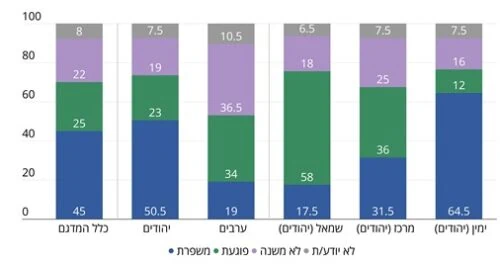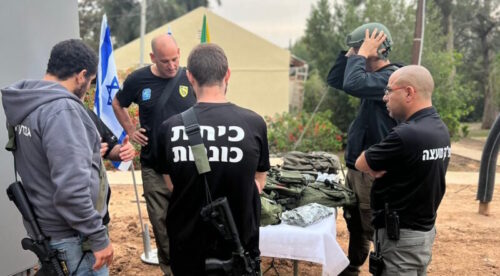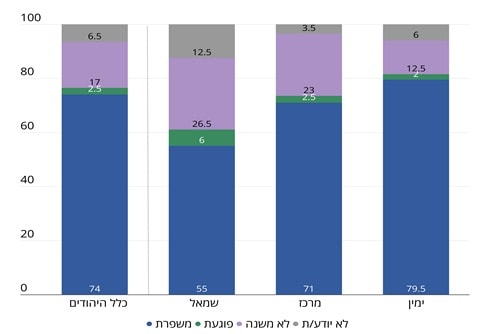
The Viterbi Center for the Study of Public Opinion and Policy at the Israel Democracy Institute published this morning (Friday) the findings of a new survey regarding the effect of the situation on the sense of personal security, this against the background of the controversy that arose after the Minister of National Security Itamar Ben Gabir instructed to ease the granting of weapons licenses since the massacre committed by Hamas on October 7 .
In the entire sample it was found that the new policy improves the sense of personal security of the largest proportion of respondents (45%). A quarter reported that the new lenient policy actually harms their sense of personal security, and 22% answered that it has no effect on their feeling.
In the segmentation of the sample by nationality, significant differences were found between Jews and Arabs: about half of the Jews feel that the lenient policy improves their sense of personal security compared to only 19% of the Arabs who feel the same way. In general, among the Arabs, 34% reported that their sense of personal security was affected by the new policy, while the largest group (36.5%) answered that their sense of personal security was not affected by the policy change on the subject.
In light of the claims that the proliferation of firearms will cause more injuries to women due to domestic violence, we compared the answers of women and men regarding the new policy and its effect on their sense of personal security. Both among the Jewish interviewees and among the Arabs, no significant differences were found between women and men on this question.
The segmentation of the Jewish sample according to political camps shows a big difference between the majority on the right who believe that the new policy improves their sense of personal security (64.5%) compared to only a minority among the center and the left (31.5% and 17.5% respectively). Among the left, 58% answered that the new policy harms their sense of personal security.
How does the Ministry of National Security's lenient policy regarding the eligibility conditions for receiving a gun license affect your sense of personal security? (%)

Dr. Yael Litmanovitz and Attorney Mirit Sharabi-Lavi, researchers at the Institute's Center for National Security and Democracy, emphasize that “the findings illustrate how deep the damage of the Shevah events in October is to the sense of personal security of Israeli citizens. The support for a significant expansion of the number of personal firearms in the hands of citizens In a certain sense, it expresses the lack of confidence in the state's ability to protect us. This has far-reaching consequences. At the same time, it cannot be ignored that for a significant part of the Jewish public – and an even larger part of the Arab society – the new weapons distribution policy actually harms the sense of security more than it improves it. It is possible that the background to the feelings is, among other things, concern among the public regarding the safe and responsible carrying of weapons in the public and private sphere, including the fear of errors in identification and carelessness in the use of private weapons during a security incident, while understanding that all efforts have not been made to ensure that the person holding the weapon is trained, skilled and competent enough, Along with the fear of weapons being handed over to criminal elements.”
Litmanovitz and Sharabi-Lavi added that the results of the survey point to the need for a poignant public discussion about the risks posed by the new policy: “The prevalence of weapons in society predicts the extent of death and injuries as a result of crime at home and on the street, including by police officers. Contrary to the prevailing public sentiment after the October swearing that links weapons For security, a significant increase in the amount of weapons in Israel also creates a danger for all citizens.” According to them, the results sharpen the importance of a responsible policy in the distribution of weapons, both in the framework of the licensing procedure and in the processes of supervision of private gun owners. “The policy regarding eligibility for firearms in Israel should be re-examined, based on the recommendations of professional committees from recent years and the extensive experience gained worldwide,” they add, and claim that “it should be openly recognized that the current policy promotes a new worldview for Israel within which the state rests on citizens and not on the security forces in order to create security.”
Attitudes regarding the establishment of emergency classes
At the Viterbi Center for the Study of Public Opinion and Policy at the Israel Democracy Institute, they also tested the extent to which the establishment of police emergency classes affects the feeling of personal security. The survey focused on Jewish society because close to 80% of the Arab respondents reported that their communities had not established an emergency department at all. Among the Jews whose settlements have a standby unit, almost three quarters answered that its existence in their place of residence contributes to their sense of personal security.

In the segmentation according to political camps, a feeling was found among the three camps that the emergency classes have a positive effect on the personal security of the residents. However, considerable differences were found between the right and the center, most of whom claimed a positive influence (79.5% and 71% respectively) and the left, where only 55% held this position. In the three camps, only a negligible percentage of respondents replied that the standby classes hurt their personal safety.
To what extent does the establishment of a police/MGB standby unit in your place of residence affect your sense of personal security? (%, those who report that there is a standby unit in their place of residence, Jews)
Dr. Yael Litmanovitz and Attorney Mirit Sharabi-Lavi point out that “the great contribution of the police's standby classes and the Mageb to the general Jewish public's sense of security creates an unprecedented opportunity for the police to strengthen and establish the public's trust in it. For this purpose, it is imperative that the required resources be allocated to the police, since the decision to establish the standby class system must be practically supported by an organizational support system for the recruitment of adequate training and accompaniment that will ensure the peace of the volunteers and the peace of the public.”
In addition, they emphasize that it is recommended that the police work to clarify to the public what the powers and roles of the volunteers are: “It should be clarified, especially for the volunteers themselves, what are the limits of the discretion of the commander of the emergency squad – who is a citizen volunteer and not a police officer – in launching and activating the members of the squad. It is also important that the police act in a manner It is as transparent as possible when it examines and handles deviations from the volunteers' authority, in order to prevent damage to public trust.”

